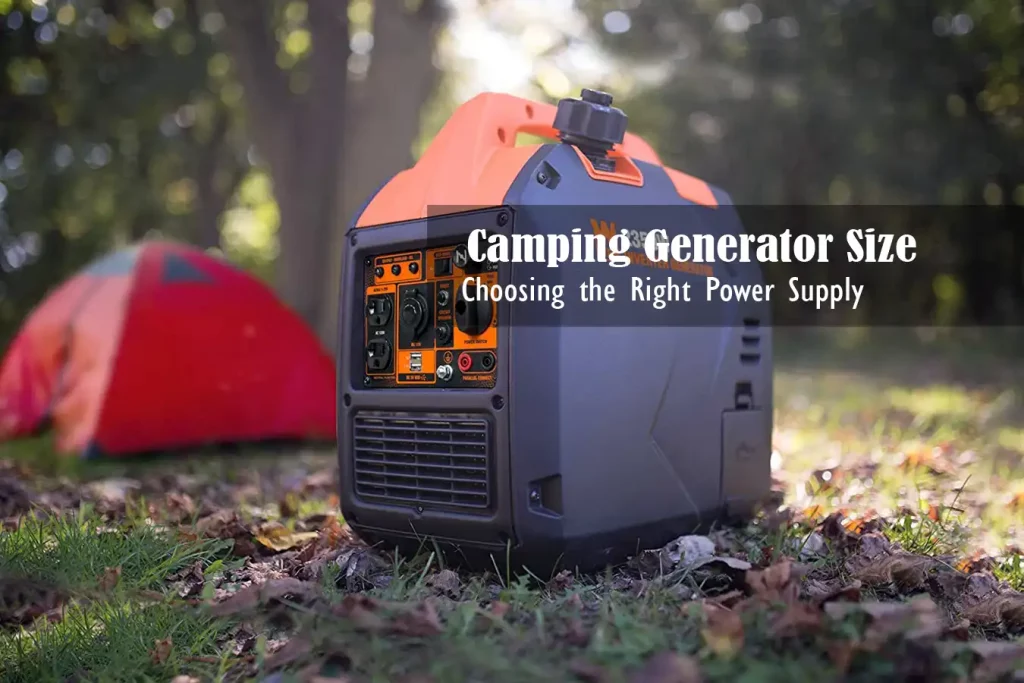Ever tried to enjoy a picturesque camping trip only to find your gadgets running out of juice? Or worse, tried to brave a chilly night in the wilderness without a functioning heater? This brings us to an essential question: what size generator do I need for camping?
Getting it right is like striking gold – it lights up your camping nights and keeps those gadgets going.
But hauling a massive beast of a generator for just a night light? Overkill.
Too small and you’re left charging your phone from the car.
Stick around, and let’s figure out the sweet spot for your camping power needs!
Understanding Power Requirements for Camping
Before you can decide on the perfect generator for your camping trips, you need to understand the power requirements for your camping gear. Here’s how you can do that.
Identifying Your Essential Electrical Devices
Start by identifying all the electrical devices you typically take along on your camping trips. This might include items like a portable heater, cooking appliances, lights, cell phone chargers, laptops, and possibly even a mini fridge. List them out, and then think about how often you use these devices. Is there something you use all day, like the mini fridge? Or is it something you only use for a few hours, like a laptop?
Calculating the Cumulative Wattage
Once you’ve identified all the essential devices, the next step is to figure out how much power they need. Check the power ratings of each device. This is usually indicated in watts (W) and can typically be found on the device’s label or in its manual. You’ll want to note both the ‘running watts’ (the power needed to keep the device running) and the ‘starting watts’ (the additional power needed to start the device).
For example, a portable heater might have running watts of 1500W but might need an additional 500W to start, making the starting watts 2000W. Similarly, a mini fridge might have running watts of 100W but need 200W to start.
Once you’ve noted down the running and starting watts of all devices, add them up separately. This gives you the total running and starting watts you’ll need for all your devices. For example, if the running watts of all your devices add up to 2000W and the starting watts add up to 2500W, you’ll need a generator that can handle at least 2500W.
Choosing the right size generator for camping involves understanding your power needs and matching those needs with a generator’s capabilities. It’s not just about having power—it’s about having reliable power that won’t let you down when you’re out enjoying nature.
What is a Camping Generator?
A camping generator, as the name suggests, is a portable power source specifically designed to be used while camping. The beauty of a camping generator is its ability to provide electricity in remote areas, far from the grid. Imagine being able to charge your phone, run a heater, or even power a small fridge while enjoying your time in the wilderness—that’s exactly what a camping generator can do for you.
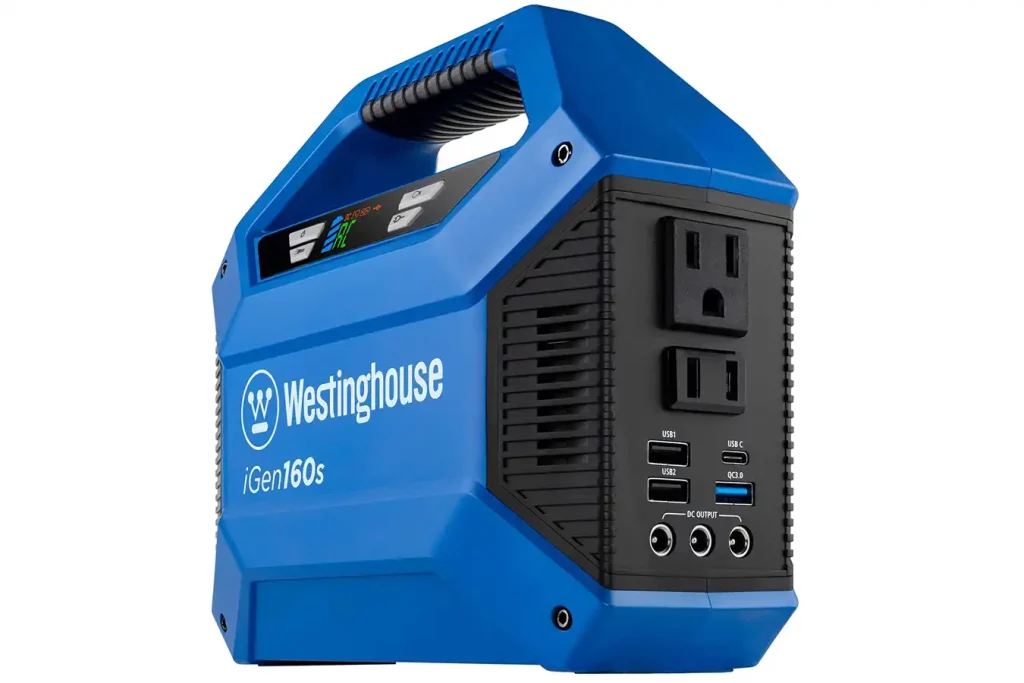
The Purpose and Function of a Camping Generator
The primary function of a camping generator is to provide electrical power for various devices and appliances during your camping trip. This can include lighting, cooking appliances, heating devices, and electronic gadgets. By converting fuel (like gasoline or propane) into electrical power, a camping generator allows you to enjoy some of the comforts of home while out in the great outdoors.
Different Types of Generators
Camping generators come in different types, primarily defined by their fuel source. Gasoline generators are the most common type, but there are also propane generators and dual-fuel generators, which can run on both gasoline and propane. There are even solar-powered generators for those looking for an eco-friendly option.
Factors to Consider When Choosing a Camping Generator
So, you’ve decided you need a camping generator. But how do you choose the right one? Here are a few key factors you should consider.
Power Output (Wattage)
First and foremost, you need to consider the power output of the generator, usually measured in watts. As discussed earlier, this needs to match the combined running and starting watts of all your camping devices.
Fuel Type and Efficiency
The type of fuel a generator uses can affect both its performance and its operating cost. Gasoline generators are generally more powerful, but propane generators are often more fuel-efficient. Dual-fuel generators offer the best of both worlds.
Size and Portability
Given that you’ll be transporting the generator to and from your camping site, size and portability are crucial considerations. Look for a generator that’s lightweight, compact, and ideally has a handle or wheels for easy transportation.
Noise Level
Generators can be noisy, and the last thing you want is a loud generator ruining the peace and quiet of your camping trip. Look for a generator with a low noise level—many modern camping generators are surprisingly quiet.
How to Determine the Size of Generator You Need
Understanding power ratings is key to determining the size of the generator you need. As discussed earlier, you’ll need to consider both running watts (the power needed to keep devices running) and starting watts (the power needed to start devices).
Understanding Power Ratings: Running Watts vs Peak Watts
To pick the right generator, you’ll need one that can handle the peak power demand (starting watts) of your devices, while also being able to supply enough power to keep them running (running watts). This is crucial, as a generator that can’t handle the peak demand could end up overloading.
Practical Examples of Generator Sizing for Different Camping Scenarios
Let’s look at some examples. Say you’re going on a basic camping trip with a small tent, a couple of LED lights, a portable heater, and your phone. The combined starting watts for these might be around 2000W, and the running watts might be around 1500W. In this case, a generator with a peak power output of 2000W and running power output of 1500W would be sufficient.
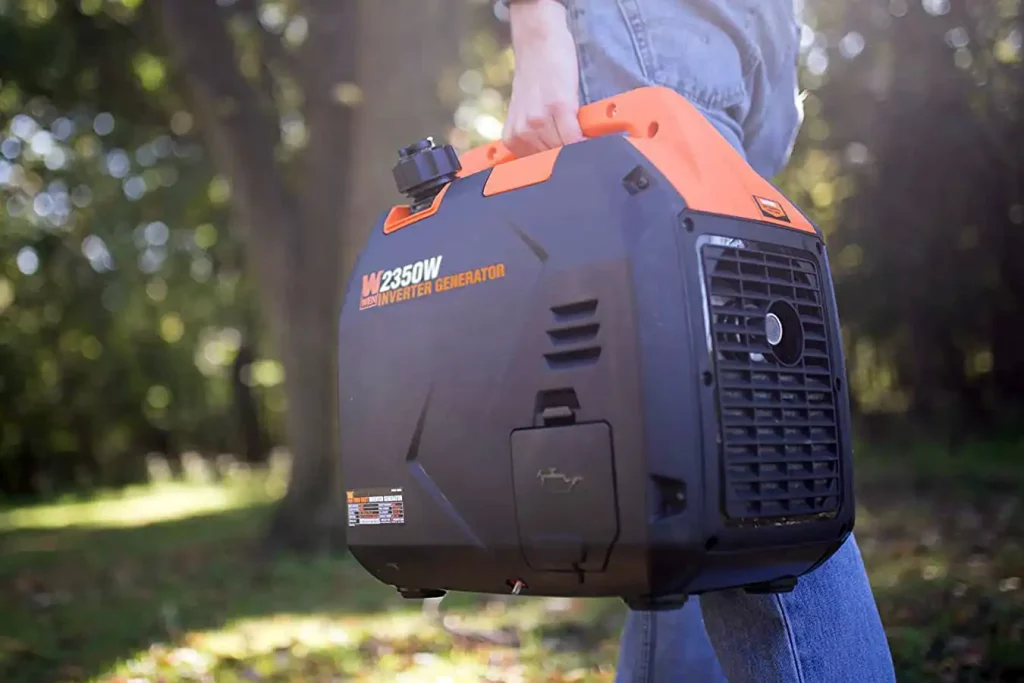
On the other hand, if you’re going on a lavish camping trip with a large tent, several lights, a portable heater, a mini fridge, a laptop, and a few other gadgets, the combined starting watts could be up to 3500W, and the running watts could be around 3000W. In this case, you’d need a more powerful generator, like a 4000W model, to safely power all your devices. Have a look at the camping generator size table:
| Camping Needs | Devices/Appliances | Power (Watts) | Recommended Generator Size |
|---|---|---|---|
| Minimal | Lights, smartphone, tablet | 100-200W | 1000W |
| Moderate | Lights, smartphone, tablet, camping fridge, heater | 1000-1500W | 2000W-3000W |
| High | Lights, smartphone, tablet, camping fridge, heater, air conditioning | 2500-4000W | 4000W and above |
Please note that the power needs may vary depending on the specific devices or appliances you use. This table provides an estimation and you should always double-check the power requirements of your devices and appliances. It’s also important to consider the start-up (peak) power of appliances which can be significantly higher than the running power, especially for appliances with motors or compressors, such as air conditioners or refrigerators.
However, the size of generator you need for camping generally depends on your power requirements, but a 2000 to 3000-watt inverter generator is usually sufficient for most small to medium-sized camping appliances and electronics.
Safety Precautions When Using a Camping Generator
Safety should be your top priority when using a camping generator. Here are a couple of precautions to keep in mind.
Proper Ventilation and Carbon Monoxide Prevention
Camping generators, especially those running on fossil fuels like gasoline or propane, can produce carbon monoxide, a harmful and potentially deadly gas. Always ensure the generator is placed in a well-ventilated area, away from enclosed spaces where gas can accumulate. Also, make sure you have a functioning carbon monoxide detector in your camping area as an added layer of safety.
Safe Fuel Storage and Handling
Storing and handling fuel safely is another important consideration. Always keep fuel in approved containers and store it away from the generator and other heat sources. Also, allow the generator to cool down before refueling to prevent accidental fires.
Top Recommended Camping Generators for Different Needs
Choosing the right camping generator depends on your specific needs. Here are a few suggestions for different scenarios.
For Minimal Power Needs (Lighting, Charging Devices)
If your camping trip only involves powering lights and charging small devices, a small and efficient generator like a 1000W model should be sufficient. These are typically lightweight and portable, making them perfect for minimalist camping.
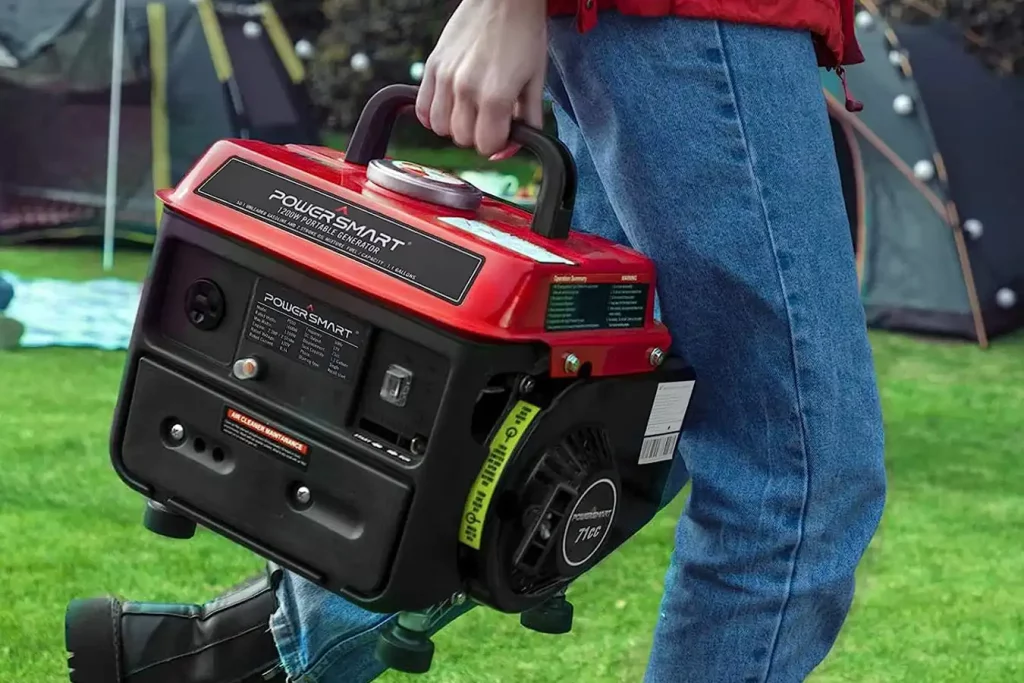
For Moderate Power Needs (Including Small Appliances)
For camping trips that include the use of small appliances like a camping fridge or a heater, a medium-sized generator in the range of 2000W to 3000W would be more suitable. These generators are a bit larger but offer a good balance between power output and portability.
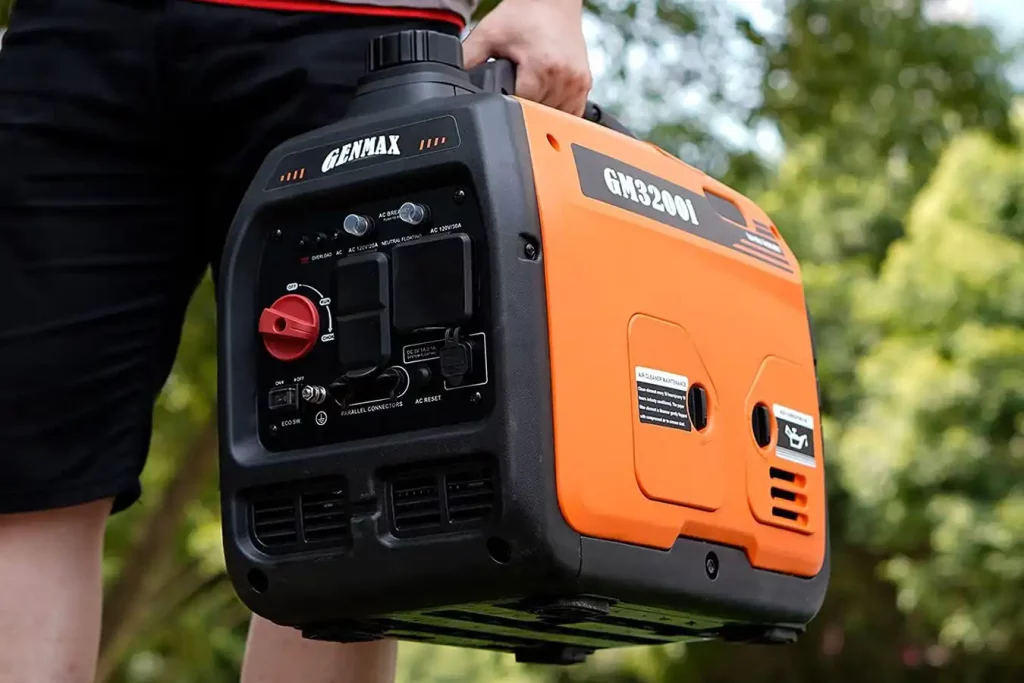
For High Power Needs (Including Air Conditioning, Heating)
For those who want all the comforts of home while camping, including air conditioning or heating, a large generator of 4000W or more would be necessary. These generators are larger and heavier but can handle multiple high-wattage appliances simultaneously.
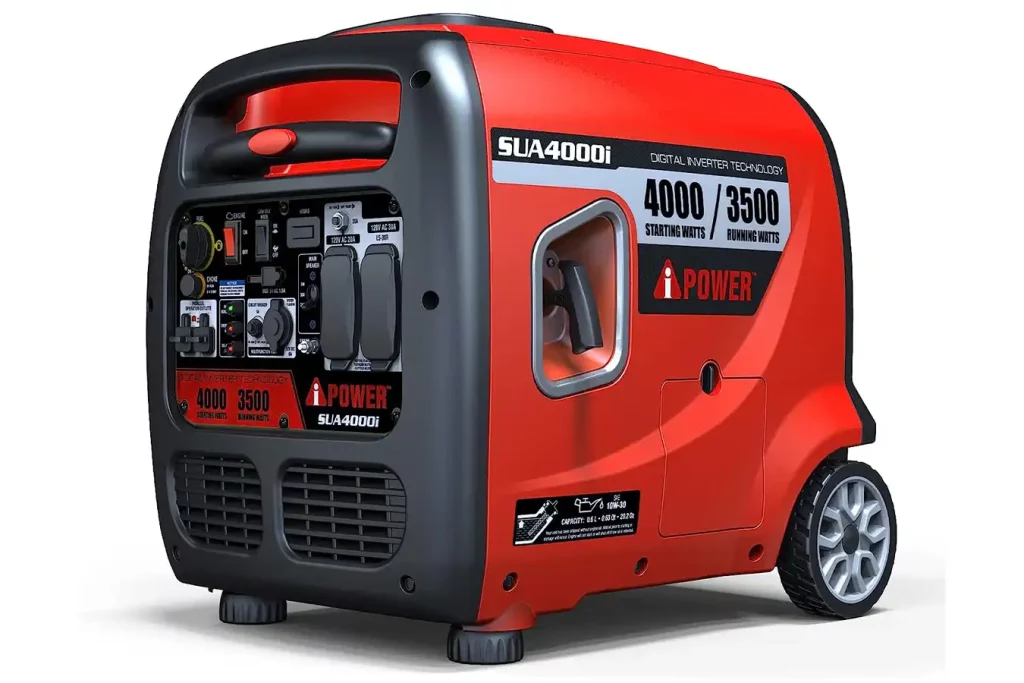
To know more: How to Keep Air Mattress Warm When Camping
FAQs about Camping Generator Size
How big of a generator do I need to run a camper with air conditioning?
What kind of generator do I need for tent camping?
Is a 4000 watt generator enough for a camper?
How big of a generator do I need to run a 50 amp camper?
Final Words
Choosing the right camping generator is a critical part of planning a successful camping trip. From powering your lights and charging your devices to running heating or cooling appliances, a generator can greatly enhance your camping experience.
However, it’s crucial to select a generator that matches your power needs, ensuring it’s neither underpowered nor excessively large. Remember to also consider factors like fuel type, size, portability, and noise level, and always prioritize safety when operating your generator. With the right planning and preparation, you can enjoy all the conveniences of electricity, even when you’re far from the grid.

